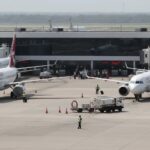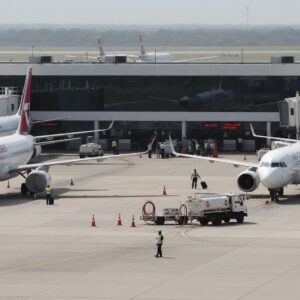In a significant development for air travelers in the United States, a new proposed compensation scheme could soon hold airlines accountable for flight disruptions, including delays and cancellations. This initiative seeks to introduce a mandatory cash compensation model, ensuring that passengers receive a set monetary amount for their inconveniences, in addition to compensation for meals and lodging.
The proposal comes in response to growing frustrations among travelers regarding the frequent disruptions in air travel, particularly in recent years where operational challenges have led to significant delays and cancellations. The move aims to enhance consumer protection and improve accountability within the airline industry.
Under the proposed scheme, airlines would be required to provide clear guidelines on compensation amounts for disrupted flights, ensuring that passengers are compensated fairly and transparently. This could force them to adopt more reliable operational practices to avoid the costs associated with compensation.
Travel advocates have lauded the proposal, arguing that it brings much-needed reform to an industry that has often left customers in the lurch during disruptions. “Airlines must be held accountable for the services they provide. Passengers deserve to be compensated fairly for the inconvenience caused by delays and cancellations,” said a representative from a leading consumer rights organization.
The proposed compensation structure would complement existing regulations, which currently require airlines to offer reimbursements and meal vouchers in the event of significant delays or cancellations. However, critics argue that the current system lacks the necessary enforcement mechanisms to ensure compliance. The new measures aim to rectify this by introducing a standard cash payment to enhance the accountability of airlines.
Supporters of the scheme point to similar regulations in other regions, such as the European Union, where passengers benefit from strong protections against flight disruptions. Many hope that the introduction of cash penalties in the US will align the country with international standards and improve the overall travel experience.
As the proposal moves through the legislative process, airlines are preparing to respond. Industry groups have expressed concern over the potential financial burden this could impose on airlines, especially small carriers already struggling with rising operational costs. “While we understand the need for consumer protections, we must also consider the viability of the airline industry. Imposing cash penalties may not be the most effective solution,” said a spokesperson for a major airline trade association.
The proposed compensation scheme also comes at a time when the industry is grappling with labor shortages, increased fuel prices, and fluctuating travel demand. These challenges have resulted in heightened scrutiny from regulators and consumers alike, prompting calls for systemic changes in how airlines operate and manage customer relations.
Travelers eagerly await the outcome of this proposed legislation, hopeful that it will lead to a more reliable and customer-friendly airline experience. As discussions continue, the focus remains on striking a balance between consumer protection and the operational realities of the airline industry.
As this proposal unfolds, it will undoubtedly reshape the landscape of air travel in the US, setting a precedent for how airlines manage customer relations and accountability in the years to come.

















More Stories
Australia’s Thrive 2030: Global Tourism Powerhouse Unleashed
Spain Beckons: Europe’s Hottest Hotel Investment Spot in 2026
Canada’s Airlines Halt Cuba Flights: Fuel Crisis Explodes